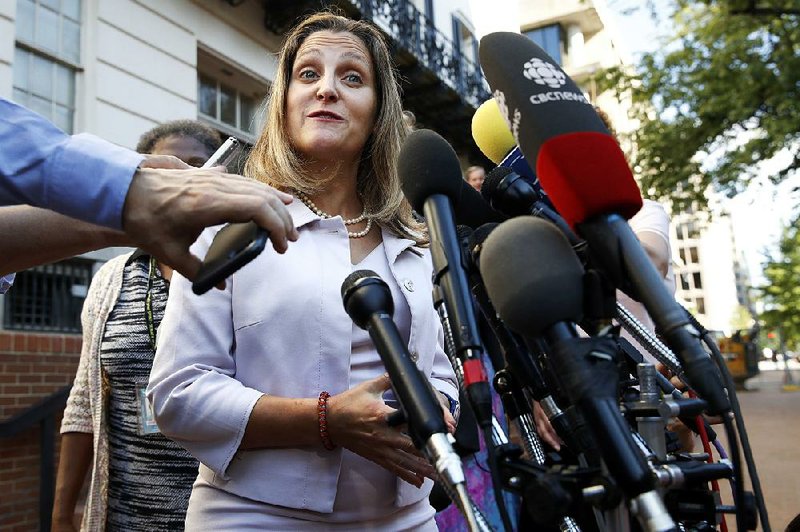WASHINGTON -- Negotiations between the United States and some of its largest trading partners yielded largely positive rhetoric Thursday, though the details of any concrete change remained unclear.
In Washington, Canadian Foreign Minister Chrystia Freeland emerged from talks with U.S. Trade Representative Robert Lighthizer to say she was "encouraged by the constructive atmosphere" as the countries attempt to rework the North American Free Trade Agreement.
"Our officials did some work, they've prepared some issues for me and Ambassador Lighthizer to take some decisions, and we're about to go in to continue negotiating to do precisely that," Freeland told reporters around midday.
Meanwhile, President Donald Trump said Thursday that he would pull out of the World Trade Organization if it doesn't treat the U.S. better, targeting a cornerstone of the international trading system.
"If they don't shape up, I would withdraw from the WTO," Trump said Thursday in an Oval Office interview with Bloomberg News.
A U.S. withdrawal from the WTO potentially would be far more significant for the global economy than even Trump's growing trade war with China, undermining the post-World War II system that the U.S. helped build.
Lighthizer has said allowing China into the WTO in 2001 was a mistake. He has long called for the U.S. to take a more aggressive approach to the WTO, arguing that it is incapable of dealing with a non-market economy such as China.
The European Union has been leading an effort to seek changes to defuse the conflict. Officials from the EU and Japan visited Washington last week to discuss potential changes as well as joint efforts to take on China at the WTO.
In Brussels on Thursday, the EU's trade commissioner, Cecilia Malmstrom, said the bloc is willing to eliminate tariffs on imported cars if the U.S. does the same -- something Trump has previously suggested he was open to. Autos were previously excluded from the discussions that focused on manufactured products bought and sold between the two markets.
Trump rejected the offer, likening the bloc's trade policies to those of China.
"It's not good enough," Trump said of the offer from Brussels. "Their consumer habits are to buy their cars, not to buy our cars."
The EU currently charges a 10 percent tariff on imported U.S. automobiles, while the U.S. charges a 2.5 percent tariff on European cars and a 25 percent tariff on imported pickups and SUVs.
In late July, Trump and European Commission President Jean-Claude Juncker stepped back from the escalating trade war by announcing the outlines of an agreement to ease tensions and avoid hitting each other with further tariffs. That preliminary deal called for both sides to "work together toward zero tariffs" on non-auto industrial goods.
In Canada on Wednesday, Canadian Prime Minister Justin Trudeau lifted NAFTA hopes when he told reporters that it was possible the U.S., Canada and Mexico could reach a deal on reworking the agreement by today.
Trudeau cautioned that Canada is prepared to walk away if the NAFTA deal does not line up in his country's best interest.
But the continued negotiations marked a change from the past several weeks when Canadian officials were largely shut out of trade discussions because of Trump's ongoing feud with Trudeau.
The acrimony boiled over at the G-7 meeting in June, when Trump called Trudeau "weak" and accused him of making "false statements."
Trudeau replied that Canada wouldn't be "pushed around" and described as "insulting" Trump's insistence that there were national security concerns forcing him to impose tariffs on imported aluminum and steel.
The Trump administration wants a deal on reworking the agreement by today so he can send a letter to Congress that would formally begin a 90-day process for revamping NAFTA.
Getting that timeline started by today matters to Trump because he wants to get a deal done by Dec. 1. That's when Mexican President Enrique Pena Nieto will step down, making way for President-elect Andres Manuel Lopez Obrador.
Lopez Obrador has had representatives at the U.S.-Mexico trade talks, but Trump doesn't want to risk the new Mexican administration's balking at a deal his team brokered with the old one.
On Monday, Trump announced that he had reached a preliminary trade agreement with Mexico and threatened to use it as a replacement for NAFTA, essentially threatening to remove Canada from the arrangement. The deal included higher wages for some Mexican auto workers to discourage U.S. car companies from relocating there.
It's unclear whether such a move would be permissible under U.S. law, but Canada quickly rushed to the negotiating table.
The trade deal with Mexico is "headed in the right direction," AFL-CIO President Richard Trumka said Thursday afternoon. But he said the deal must include Canada.
"It should be a three-country deal," Trumka said during an interview on Bloomberg TV. "Canada, the U.S. and Mexico should be together."
Trumka questioned setting a deadline for today. "We think it's more important to get this right than it is to meet some kind of artificial deadline," he said.
Information for this article was contributed by Jeanne Whalen, Jeff Stein and Heather Long of The Washington Post; by John Micklethwait, Margaret Talev, Jennifer Jacobs and Christopher Flavelle of Bloomberg News
A Section on 08/31/2018


